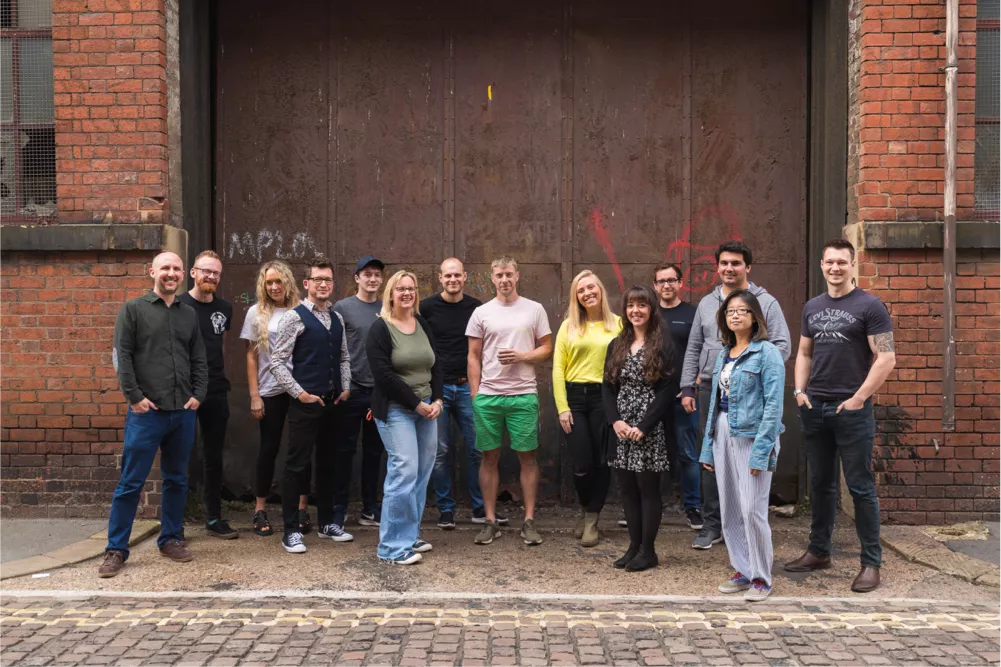Joi Polloi’s Teammates Have More Autonomy Since Using Productive

Joi Polloi is a creative technology agency based in the UK. Before moving to Productive in April 2020, the team was using a number of different tools to manage their business. We spoke with Jason Devoy, Delivery Director and Producer, Melodie Ash about the positive impacts they’re seeing from using Productive.
Related: The Best Creative Agency Project Management Software
You’re a creative tech agency. What industries do you do work for most?
Jason: We do website design and development, general communications stuff, we also do a lot of bespoke R&D and platform development. We’ve done various products for the TV and broadcasting industries and we do a lot of work for the museums and heritage sector.
You were using multiple tools before Productive, right?
Jason: We were using Harvest for time tracking and budget monitoring and Harvest Forecast for scheduling and forecasting. We were also using Asana for ticketing within project management. We’re still using Xero but now it’s integrated with Productive for our payments. We were also using Podio for leads and opportunities and tracking contracts.
Melodie: A lot of information was getting lost between all the tools we were using before. Productive helped us on our road to streamlining everything. Doing sales and day-to-day project management has been quite challenging and it’s been great to manage that all in one place.
Related: 11 Best Harvest Alternatives
“The key metrics for any agency are: how busy are the people? How are we doing with bringing in new work? How are we budgeting that work? How are we forecasting further down the road for new work? From a delivery point of view, our job is keeping people busy, and that’s by getting new work in and seeing it successfully delivered.“
Achieve Your Agency’s True Potential
Switch from multiple tools and spreadsheets to one scalable agency management system.
We Help Your Agency Reach New Heights
Switch from multiple tools and spreadsheets to one scalable agency management system.
It must have been a real challenge to manage so many different production projects in that many apps!
Jason: What was important for us was to do an audit of what we were using and consolidate them in a way that we use fewer tools and get better data. The key metrics for any agency are: how busy are the people? How are we doing with bringing in new work? How are we budgeting that work? How are we forecasting further down the road for new work? From a delivery point of view, our job is keeping people busy, and that’s by getting new work in and seeing it successfully delivered.
What do your sales processes look like now?
Melodie: Leads and opportunities were handled quite differently. With Podio, it was a lot of changing between views and there was a real lack of anything concrete in terms of TODOs. From our Monday morning meetings to the following week, nothing would have really happened.
What’s been good in Productive is assigning people to TODOs on sales activities. A lot of projects we pitch for are very complicated and not just sticking a quote together. You need a full creative response and a full technical response. Being able to delegate roles based on opportunities has probably been the most effective thing in Productive. It gives more accountability to people and a clear direction of what their role in the particular opportunity is. Whereas before, I think we lost out on a lot of opportunities because we weren’t proactive.
It’s been great for really quick stuff with clients, like being able to use the quoting tool to be able to put together a new proposal, and of course, turning a won deal into a project.

Looking at your sales strategy, did you learn anything from your new sales data?
Melodie: Yes. One of the key things it’s shown me was that we need to be more realistic when setting up our budgets.
In Productive, time also means money, i.e. costs for your business. Were there any surprises after switching to Productive and seeing more accurate data? Did some clients suddenly appear less profitable and less attractive?
Jason: I’m not sure that there were surprises, but they confirmed our worst suspicions. It’s really helpful to see the budget you get for a piece of work and the actual amount of time spent on that piece of work. Whether that’s a cost to the business or something we’ll charge to the client—the evidence is plain to see for work that is underestimated.
Did you adjust some service rates after finding out how profitable certain services were?
Jason: I wouldn’t say that we changed services rates that much, but we figured out where we need to improve our estimating or be more rigorous with clients on what they’re getting for their money because obviously, you don’t want to overrun every project.
You said that you were working on getting more consolidated data and processes. How has your workflow improved—did you come up with a project template or workflow that works optimally for certain types of projects?
Jason: I think the process is a lot clearer and more focused than before. Working remotely, we work with producers, developers, designers that aren’t collaborating in person anymore. Having most of our communication flow through Productive has improved efficiency because it’s all in one place.
We’re not reinventing project management, but what we have done is refined our processes to make it easier for people to get what they need at the right point. From a producer’s perspective, it’s been really helpful to be able to see the project management side of things in Productive, as well as the financials and the end-to-end: sales to projects and delivery cycle as well.
Melodie: Productive has given the team a lot more autonomy. Before, in Asana, it was much more a developer working on a ticket and handing it back to a project manager, and not so much focused on accountability. I’m very keen on agile processes and I think Productive helps us be more accountable by reassigning tasks to different team members. Now our developers have more autonomy in their involvement in projects.
Also, the ability to log time directly against a task that was just done instead of going through the week and trying to backtrack how much time was spent on what has improved our efficiency.
“Productive has given the team a lot more autonomy. Before, in Asana, it was much more a developer working on a ticket and handing it back to a project manager, and not so much focused on accountability. I’m very keen on agile processes and I think Productive helps us be more accountable by reassigning tasks to different team members. Now our developers have more autonomy in their involvement in projects.”

How about the whole working from home situation? Have you introduced any new routines?
Both: Yeah, we have!
Jason: We’ve had to get used to working remotely and we’ve experimented a lot: daily stand-ups, end-of-the-day stand-ups, catching up as an agency, or for certain projects. Being able to get together with the team, share screens and project boards, and check up on the status of tasks as you would do in person while working remotely has been very useful. The moment you start to stray from a shared resource, you don’t have everyone on the same page. Keeping everything recorded in Productive has been very helpful.
You said that people started tracking time on projects, which is good because it gives you a really detailed overview of how your budgets are being spent. Would you say that you’re better at estimating time for projects now?
Melodie: Productive has definitely helped with estimating time. It also comes with the accountability that I was talking about earlier. Before our teammates might have given an estimate and they didn’t really see how those hours were being used. I think it helps them get a lot better at how they’re estimating hours because they’ve got that full accountability now. That, in turn, helps us.
As producers, we have two strings of projects: actual projects and retained support or maintenance for clients. With retainers, we’ve got a lot more fixed costs, so the reporting has been a lot more accurate now. We can look at things and say: “We’ve estimated that much time for that task and the clients have been burning through the budget a lot faster than we initially thought.” It’s helping us be a lot more efficient on that side.

“If I had to choose the main benefit of switching to Productive, it would be having visibility of everything in one place: from sales through resources, projects to delivery, plus the time logging and profitability figures in one place—being able to track the end-to-end lifecycle of a project.”
How has utilization and profitability monitoring changed since moving to Productive? Could you even have gotten all those numbers before?
Jason: I think a lot of the data we had before wasn’t accurate or we didn’t have the data that was required so you couldn’t run any reports from it. When I look at the utilization reports since we’ve started using Productive, they do show a slow increase because people have been getting used to tracking time. It’s really helpful not only to see how busy people are but how busy they are on billable work.
The forecasting report is really helpful as well because it shows what our budget is, what our profit margin is likely to be, and what we need to do to keep a project healthy. Forecasting is something that I believe will only grow and become more accurate.
The new data you have now is probably helping you make better decisions.
Jason: Yes. If I had to choose the main benefit of switching to Productive, it would be having visibility of everything in one place: from sales through resources, projects, to delivery, plus the time logging and profitability figures in one place—being able to track the end-to-end lifecycle of a project.
Anything else you’d like to share to wrap up?
Melodie: I don’t know how we’d work through the first lockdown if we had been using our old method!
Achieve Your Agency’s True Potential
Switch from multiple tools and spreadsheets to one scalable agency management system.


